
Our world is moving faster than ever. The speed of technology, gadgets and smart phones provide a constant overload of information that puts our bodies under an incredible amount of physiological stress.
This relentless chronic stress sweeps under our skin and gets stored in our tissues, robbing us of energy, causes poor concentration and affects our breathing. The very core of our physiology is our breath and the process of respiration is the exact place where we can take back control and begin to make profound changes for our state of being.
So today, allow me introduce you to your respiration. Your breath is the single most powerful process that can either make you horribly anxious and tired, or restore your energy and make you feel calm and centered.
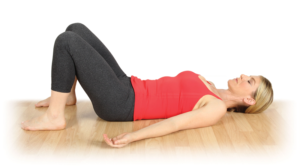
When you are stressed, your nervous system automatically flips to the “sympathetic response”. This is the part of your nervous system that gives you energy to run away from danger, bringing vital force away from your organs into your muscles and increasing your breath rate. Although there is no real enemy behind your back, the constant high levels of stress will eventually make you a fast and inefficient breather.
Stressful, rapid breathing drains your battery, similar to when you have multiple apps on your iPhone – your energy runs out faster without ample time to recharge.
Stress breathing completely bypasses the main engine of breathing, the respiratory diaphragm. This pushes the burden to the accessory breathing muscles: pecs, scalenes and levator scapulae. The constant fight or flight state robs the energy from our adrenals as they continually respond to the demands of cortisol, a stress hormone. That’s why you need your 5th cup of coffee by 3pm and are too exhausted to give any more energy to your family when you finally get home. You are cranky, tired and exhausted.
Ideally, the respiratory diaphragm should contract and move downward as you inhale, resulting in a swelling of the abdomen. On exhale, it moves back into its natural resting position, causing the deflation of the abdomen. This continuous rhythmic movement creates mobility in all surrounding organs, including the heart and lungs, resulting in better digestion, elimination and overall health. (Diazepam) In addition, abdominal breathing triggers the relaxation response (opposite of the stress response) and is mandatory for our bodies to heal, repair and restore.
Furthermore, if you are person who suffers with chronic pain, breathing slowly for 3 minutes will start the process of diminishing your pain. Yes, you are reading correctly: you can change your pain signals just by quiet abdominal breathing. Stress changes breathing, but you can alter your stress by controlling your breath – all in the span of 3 minutes. This is not an expensive operation and you don’t need any special equipment, clothes or technology. Truly, the power of oxygen fits in for any budget. The breathing solution is so simple that we often forget its healing effects, diminishing the relaxation power that lies right in front of our nostrils.
Come back Friday for the 3 minute stress shifting technique!
Learn more about stress relief with Yoga Tune Up®.
Tune down your stress with the Quickfix online videos.
If you like this article, read Building a Coregeous EmbodyMap, Starring the Diaphragm


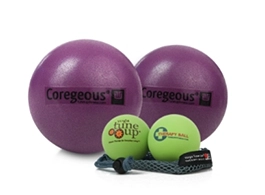
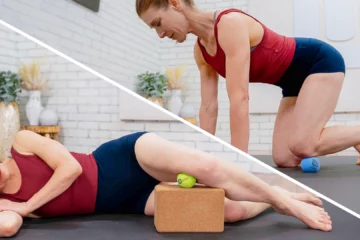
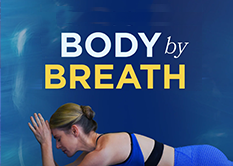



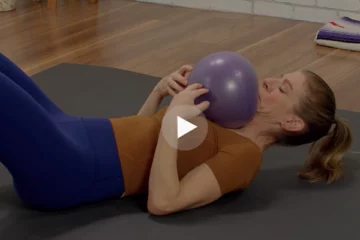
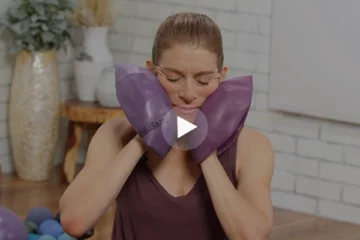
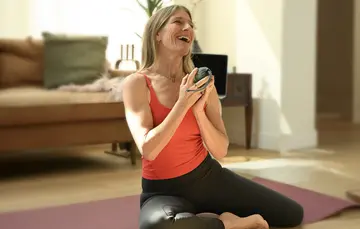

I love this reminder that it only takes 3 minutes to reset your breath – maybe even less to contribute to fuller breathing. The breath is often one of the most overlooked tools in our kit, that is always available to us – at any point. Taking mini breath breaks and starting all movement practice with at least 3 minutes of breath awareness are two ways I keep this top of mind for myself and my students. Thanks Dagmar!
Wow, it’s awesome that you talked about how the way we breathe plays a huge role in how we feel. These past few days have been extremely stressful for me. My job has been draining all of my energy, and I’m feeling very tired. That’s why I’m researching how to lower my stress levels, and I think I’ve found the answer. I really appreciate you helping me learn breathing techniques to reduce my stress levels.
nice one Dagmar. You are so right, we often forget the simple things.
The breath is so important as through learning about our bodies, we can adjust our energy level and also our stress level.
Totally agree the stress breathing impacts to pecs, scalenes and lavator scapulars. Tight neck and shoulders show up under stress situations.
The power of breathing ! Got this cool app on my phone : Kardi ! its helps
I’m going to try this before performing on stage and when I`m feeling overwhelmed. I often feel my breath shortening and my fight or flight responses firing up in these circumstances and sometimes I need a quick fix that I am confident will work!
I’m in shocked from “you can change your pain signals just by quiet abdominal breathing.” I wish I would have known better. It is so simple and easy way to reduce pain I never though of. I would love to tell this my mother who has chronic shoulder pain.
How simple to do but often overlooked or never even thought of as a technique to control or minimize how we react to stress and pain. Thanks for enlightening us as to the many ways our breathing can affect us physically and mentally and how we do have control over how we handle stress and sometimes pain. This has been a huge benefit of becoming more educated in the world of Yoga Tune Up®. I love how my body feels after implementing different breathing techniques and, it doesn’t cost anything! Great article, Dagmar.
Such a great reminder that abdominal breathing turns on the sympathetic response and decrease the stress response. I think as teachers we need to remind our students to practice this when they’re not on their mats!
Thanks for this great reminder, Dagmar. I especially appreciate your mention of the accessory breathing muscles because I tend to get very stressed and am also very tight in the scalenes, pecs, and levator scapula, especially on one side, so it’s like a vicious cycle! I can see this being very helpful for me, but I also have a student with M.S. who gets extremely anxious and also has some neck issues who feels that controlling her breath in any way feels uncomfortable and sometimes makes her even more anxious. Do you have any thoughts on how I could modify this exercise for her to make her more comfortable?
I love this article. Through this Yoga Tune Up training I have been re-introduced to the diaphragm. This amazing muscle that we take for granted but it is lined to so many functions and structures in our bodies. We can ignore this muscle and it will continue to do it’s job, but when we bring our conscious attention to the diaphragm we can really utilize it for all it’s amazing benefits. It is my new favourite muscle.
I love massage as a stress and emotional relief and wish I could fold my therapists in my bags and take them anywhere with me! But before that becomes possible I am pretty happy I kept practicing abdominal breathing to calm myself down when needed, and I am getting better and better at it…. As a combo, the small balls are also a quick fix for me that I personally use at the base of the skull and which give me that “O YEAAAAAH!!!” feeling and instant emotional relief that I seek often. It is easy and save lots $$$!
@Tracey Silverman- this is extremely valuable input. Yes, 5 minutes of movement medicine is 4X faster than any pill, plus there are no side effects and you get to feel INCREDIBLY EMPOWERED.
So excited to be on this Movement Revolution!
We’re all about quick fixes and this is about as quick, cheap and easy as it gets! I recently read that 90 seconds of pressure through touch, massage or rolling on the YTU balls can reduce pain in the body as effectively as a pain pill. Breath plus compression in under 5 minutes to relax and reduce pain. It doesn’t get much better than that!
Thanks for sharing your insight on shifting your stress level in 3 minutes. I always like reading what other professionals write in regard to the stress response and the autonomic nervous system, Finding a calm breath without forcing it definitely helps to quiet the sympathetic nervous system. I think everyone who works should take 3 minutes out of their work schedule to find calmness in their breath. Thanks for sharing!
Isn’t it amazing how quickly we can down regulate. It is always my hope that more and more people take n this mission for themselves. It is my observation that people really opperate at their best when they have the tools to regulate their systems. Keep spreading the good word. The faster the world gets the more we need to equip ourselves as teachers to teach these skill to others.
Thank you for this post. I’m particularly interested in the vagus nerve. Soft diaphragmatic breathing stimulates the vagus nerve and the parasympathetic response of the body. For many years, as a yoga teacher, I used the cue take a deep breathe. I was taught later that language actually misleads people in their own body. It makes the breathe more forceful than it needs to be. Low and slow seems to be better.
I love reading about the importance of the breath it influences so much more than (most) people give it credit for. it’s most definitely one of the most important parts of my practice and in my classes. Thank you for the reminder Dagmar!
Coming back to the natural wisdom of the body, through our breath. I often find it dismaying that the western population can rely so heavily on medication instead of using the resources within, perhaps we mistrust the simplicity of it, or our we simply not taught how vital breathing well can effect us? Our breath is free, it’s portable, with us at all times & a direct reflection of our wellbeing, thank you for this timely reminder.
It is such a blessing that we have at our constant disposal an invaluable tool for relieving stress and all of the subsequent physical consequences. The breath is our constant companion and healer!
When I get really stressed out at work or in my personal life, I forget that I have all the tools I need to help my mind and body calm down. As my yoga practice has advanced and I have become more aware of my breath, my anxiety has improved. When I mentally step away from my spinning thoughts and concentrate on my inhales and exhales, I am immediately aware of my heart rate dropping, my jaw loosening and my muscles relaxing. My relationships with coworkers, family and friends have also befitted from my breath awareness because I can avoid reacting impulsively to situations and can make smart decisions about my interactions with others.
One of my favorite yoga teachers used to say “Always come back to your breath”. Thank you for remaining me of the importance and power of the breath.
Thanks for the reminder of the power of the breath for relaxation. Not to mention, it helps calm the mind so we can better tackle the things that make us stressed in the first place!
It really amazes me to find out that proper breathing techniques can help restore a sound mind and body. In spite of a busy lifestyle, it is important to take time and engage in practices that can destress you even with just a few minutes of your time.
I find that gently breathigng through my nose and staying present brings me connection with myself.